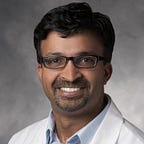One size does not fit all
Why we need decision support tools that are personalized to the patient
I founded the Stanford SSATHI clinic in 2014 because there was an alarmingly high rate of cardiovascular events in young South Asians, and I wanted to attack this crisis head on. We treat a younger population, in which we perform non-traditional risk factor screening and aggressive risk reduction therapy. The traditional risk factors that drive heart disease for the general population comprise only a minority of the risk for South Asians. Non-traditional factors like insulin resistance and inflammation are more impactful to the prognosis of a South Asian, yet virtually none of our patients have been screened for these abnormalities in the past. Along the way, I’ve realized there may be more streamlined and intelligent avenues to better heart health. A tool that maps individual patient data to evidence-based medicine can produce a personalized recommendation that is quite useful for doctors from both a time-efficiency and quality perspective. Building this tool was the inspiration for founding HealthPals.
“Patients deserve personalized care”
No one disagrees with this statement, but what does it really mean?Everyday, doctors treat patients using guidelines and population data that fail to account for who the patient is: age, gender, ethnicity, socioeconomic status, stress, religion. Even other disease types (comorbidities) may be overlooked or difficult to factor into the final care plan for a patient. It is not surprising that this lack of personalization yields variable outcomes for a population, and this variability has lowered the quality of healthcare around the world. We must do a better job of tailoring treatment to the individual, and this begins by breaking the ‘cookie cutter’ medicine mold.
Introducing HealthPals: Merging medical science with data science
Clinical trial data and large registries contain a wealth of information. By mining this data, combining it with other datastreams, and merging it with real-world clinical treatment observations, HealthPals has uncovered individual propensities (risk) for particular diseases and even individual likelihoods of a biologic or behavioral response to specific therapies. Built on a robust platform engine, HealthPals is equipped to add new datastreams (genomic, microbiomic, wearable) that will continue to optimize clinical decision making and patient care in transformative ways.
Follow HealthPals:
Linkedin | Twitter
